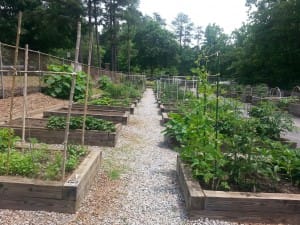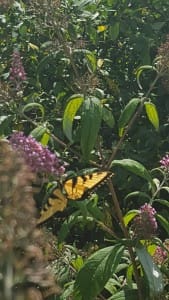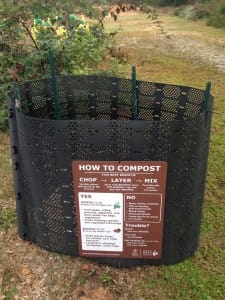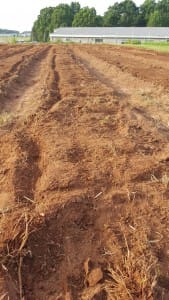 We wish you and your family a Happy Holiday season! Thank you for letting us be a part of your inbox during 2015 and we look forward to being a part of your garden in 2016.
We wish you and your family a Happy Holiday season! Thank you for letting us be a part of your inbox during 2015 and we look forward to being a part of your garden in 2016.
-Becky Griffin and the team at Georgia Center for Urban Agriculture.
Empowering Georgia through UGA Extension
The Georgia Center for Urban Agriculture is excited to announce that Mr. Greg Huber will be our new Training Coordinator effective January 1, 2016.
Over the past decade, Greg has trained Georgia’s Green Industry workforce as the Program Coordinator, Lead Instructor, and Advisor for the Southern Crescent Technical College Horticulture Program. Greg’s diverse background in the industry includes Christmas Tree Farming, Carpentry and Construction, Landscape Management, Retail Nursery Sales, Landscape Installation, Site Planning, and Landscape Architecture. In 2014 he received the Georgia Green Industry Association’s Educator of the Year award and is also a past recipient of the Southern Crescent Technical College Rick Perkins Award for Excellence in Technical Instruction.
Mr. Huber holds a Bachelor of Landscape Architecture degree from the University of Georgia and is a Georgia Registered Professional Landscape Architect. Greg is active in professional, educational and community clubs and activities. He brings enthusiasm, passion and expertise to his position and to the unit. Our unit is eager to begin the New Year with Greg leading the direction of the Georgia Certified Landscape Professional and Georgia Certified Plant Professional programs.
Join us as we welcome Mr. Greg Huber to our team in the Georgia Center for Urban Agriculture and the UGA Griffin Campus.
Axel Avila, a professional trainer from North American Training Solutions, taught thirty industry professionals in-depth chainsaw safety.
Great feedback from the crowd:
“Instructor was great with hands-on stuff.”
“Loved the class.”
“Could of used this program years ago.”
One of the beautiful things about all types of gardens is the opportunity to see wildlife – birds, butterflies, bats, beetles, lizards – all types of wildlife. A garden is truly an outdoor classroom. Many school and community gardeners work towards having their gardens become certified wildlife habitats.

Sadly, sometimes school or community vegetable gardens get blamed for harboring undesirable wildlife, like rodents. This can be a real problem for the gardeners.
Wildlife need food, water, and shelter. Those things can be found in a garden, near a dumpster, or in buildings. A large population of rodents need a large amount of food and a few seeds from end-of-the-season garden sunflowers will simply not sustain a large population of rodents.
If your garden is being blamed for a rodent problem, determine where the rodents coming from and what is attracting them. Could it be leftover food from a playground or picnic area? Are dumpsters being improperly used? Has something recently changed, like nearby land being cleared that would displace wildlife and send them into your area? Are bird feeders spilling an excessive amount of feed? Chances are, a vegetable garden may not be the problem at all.
Setting out traps may help you all get a handle on the problem. You should be able to see just how many, and what type, of rodents you are dealing with. For example, voles eat the roots of any type of plants not just the roots of vegetables. If it is just a few rodents you can just trap and relocate them.
If a community leader or school official is concerned about your garden and rodents there are several steps you can take:
 not leaving weed piles and overgrown plots for mice to hide in. You are harvesting the vegetables just as they become ripe and not letting overripe vegetable stay in the garden.
not leaving weed piles and overgrown plots for mice to hide in. You are harvesting the vegetables just as they become ripe and not letting overripe vegetable stay in the garden.As a bonus, to assist with a property-wide rodent problem consider adding owl nesting boxes to attract these rodent predators. This would also add another wildlife dimension to your property!
An overall rodent problem is not a reason to eliminate a well maintained school or community garden. For more information see the UGA publication Resolving Human-Nuisance Wildlife Conflicts. Or, contact your local UGA Extension agent. Thanks to the many UGA Extension agents who assisted in this blog post!
Happy Gardening!
eXtension is seeking 200 individuals to co-invent the future. They’re calling this group the i-Three Issue Corps!
eXtension is looking for individuals who have plans of work involving either climate or food systems.
UGA Extension and Center professional Becky Griffin is being nominated with her Pollinator Spaces Project.
The Pollinator Spaces Project assists pollinators by increasing needed habitat through a multi-faceted initiative. Throughout the state of Georgia, community and school gardeners are encouraged to add pollinator habitats to their gardens. Online resources and in-person trainings are offered to teach gardeners about pollinators, plant selection, garden design, and habitat enhancements. University of Georgia Extension agents, specialists and collaborative partners provide the resources and trainings.
Help us nominate Becky Griffin to eXtension’s i-Three Corps by voting online!
Great day at EDGE Expo 2015. We had 59 participants learning all about insect ID.
Do you know which insects in your landscape are helpful versus harmful?
It is gift-giving season and we want to share a useful gift that is easy to construct with scrap wood.
We have mentioned using a tamper in several other blog posts. It is a very useful tool to ensure good seed-to-soil contact when working with small seeds like spinach, lettuce, carrots, and collards. The weight of the tamper is all that is needed to compress the soil slightly.
I was first introduced to this tool by Jim Hall, a Cherokee County Master Gardener. He guaranteed a higher germination rate of small seeds by just using the tamper!
The tamper is easy to construct and makes a great gift for a gardening friend or for yourself! You will need a 2X4 wood piece, a 1X2 (or 2X2) wood piece, and a wood screw.
Step One: Measure and cut 1 foot off of a 2X4. This will be the base.
Step Two: Measure and cut 4 feet off of a 1X2 (or a 2X2). This is the handle.
Step Three: Choose a wood screw that is at least three inches long so it will go through the 2X4 piece and into your 1X2.
Step Four: Drill a pilot hole in the middle of the 2X4.
And into the end of the 1X2.
Step Five: Using your wood screw attach the pieces:
Your final product:
The tamper can be creatively painted or left bare. Using the tool is easy. Place small seeds on top of garden soil. Sprinkle about 1/4th inch of soil on top of the seeds. Gently tamp the soil with tool. The weight of the tamper is enough pressure to ensure seed-to-soil contact. No need to press down.
Happy Gardening!

December 5th is World Soil Day, a fitting end to 2015’s International Year of Soil.
The 68th UN General Assembly declared 2015 the International Year of Soils and the Food and Agriculture Organization of the United Nations implemented the program, within the framework of the Global Soil Partnership and in collaboration with Governments and the secretariat of the United Nations Convention to Combat Desertification.
The goal of the project was to increase awareness and understanding of the importance of soil for food security and essential ecosystem functions. Your local UGA Cooperative Extension office probably offered a class on soil health or composting during the year. There were several offered in the metro Atlanta, Georgia area.
Want to challenge yourself on soil trivia? Take the soil quiz from the International Year of Soils website. Want more information on composting and healthy soil? See UGA’s Composing and Mulching publication or visit Food Well Alliance’s healthy soil resources.
Finally, Gregor Skoberne created this YouTube video on worms making compost. This video will make you really appreciate the process of making compost and healthy soil.
Happy Gardening!